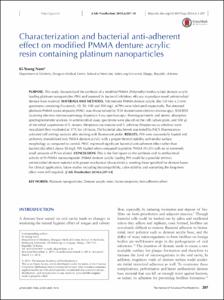Characterization and bacterial anti-adherent effect on modified PMMA denture acrylic resin containing platinum nanoparticles
- Keimyung Author(s)
- Nam, Ki Young
- Department
- Dept. of Dentistry (치과학)
- Journal Title
- Journal of Advanced Prosthodontics
- Issued Date
- 2014
- Volume
- 6
- Issue
- 3
- Abstract
- PURPOSE. This study characterized the synthesis of a modified PMMA (Polymethyl methacrylate) denture acrylic
loading platinum nanoparticles (PtN) and assessed its bacterial inhibitory efficacy to produce novel antimicrobial
denture base material. MATERIALS AND METHODS. Polymerized PMMA denture acrylic disc (20 mm x 2 mm)
specimens containing 0 (control), 10, 50, 100 and 200 mg/L of PtN were fabricated respectively. The obtained
platinum-PMMA nanocomposite (PtNC) was characterized by TEM (transmission electron microscopy), SEM/EDX
(scanning electron microscope/energy dispersive X-ray spectroscopy), thermogravimetric and atomic absorption
spectrophotometer analysis. In antimicrobial assay, specimens were placed on the cell culture plate, and 100 µL
of microbial suspensions of S. mutans (Streptococcus mutans) and S. sobrinus (Streptococcus sobrinus) were
inoculated then incubated at 37oC for 24 hours. The bacterial attachment was tested by FACS (fluorescenceactivated
cell sorting) analysis after staining with fluorescent probe. RESULTS. PtN were successfully loaded and
uniformly immobilized into PMMA denture acrylic with a proper thermal stability and similar surface
morphology as compared to control. PtNC expressed significant bacterial anti-adherent effect rather than
bactericidal effect above 50 mg/L PtN loaded when compared to pristine PMMA (P=.01) with no or extremely
small amounts of Pt ion eluted. CONCLUSION. This is the first report on the synthesis and its antibacterial
activity of Pt-PMMA nanocomposite. PMMA denture acrylic loading PtN could be a possible intrinsic
antimicrobial denture material with proper mechanical characteristics, meeting those specified for denture bases.
For clinical application, future studies including biocompatibility, color stability and warranting the long-term
effect were still required. [ J Adv Prosthodont 2014;6:207-14]
KEY WORDS: Platinum nanoparticles; Denture acrylic resin; Nanocomposite; Anti-adherent effect
- Keimyung Author(s)(Kor)
- 남기영
- Publisher
- School of Medicine
- Citation
- Ki-Young Nam. (2014). Characterization and bacterial anti-adherent effect on modified PMMA denture acrylic resin containing platinum nanoparticles. Journal of Advanced Prosthodontics, 6(3), 207–214. doi: 10.4047/jap.2014.6.3.207
- Type
- Article
- ISSN
- 2005-7806
- Appears in Collections:
- 1. School of Medicine (의과대학) > Dept. of Dentistry (치과학)
- 파일 목록
-
-
Download
 oak-aaa-4475.pdf
기타 데이터 / 1.26 MB / Adobe PDF
oak-aaa-4475.pdf
기타 데이터 / 1.26 MB / Adobe PDF
-
Items in Repository are protected by copyright, with all rights reserved, unless otherwise indicated.